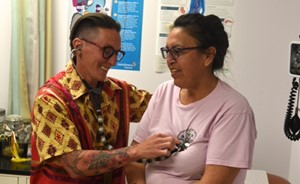Getting the care that you need
As a Two-Spirit & LGBTQ+ person living with advanced illness, you may feel worried about receiving care because of past experiences with discrimination. Inclusive care acknowledges the ways that different forms of discrimination can interact and affect 2SLGBTQ+ people. It also actively takes steps to eliminate all discrimination when providing care.
“Acceptance is slowly creeping along. Couples can now look at care facilities together and may even be cared for and supported by members of their own 2SLGBTQ+ community.”
“When I asked if I could get in the bed with my wife, they said, ‘Of course you can climb into bed with her.’”
Both inclusive care and palliative care are concerned with your physical health and your mental, emotional, spiritual, and social well-being. Care is also patient-centred. This means that you and anyone else you choose will be involved in making decisions about your care.
Without your input, care providers may make incorrect assumptions. For example, your gender identity and expression may not match other people’s perceptions. A care provider may contact or share information with someone with whom you conflict or no longer have contact, such as a parent or an ex-partner/spouse.
It’s important to be as clear as possible about what and who matters to you. Some examples of information that you might want to share with your team include:
Your identity and personal history:
- How do you identify your gender and sexual orientation?
- What are your preferences about dress, grooming, and roommates?
- Does the gender or sexual orientation of care providers matter to you?
- What else might be important for the team to know – e.g., are you a trauma survivor, refugee, widow(er)?
Your personal relationships:
- Who is – and is not – ‘family’ for you?
- Whom do you want – or not want – to be able to visit you or attend appointments, physical examinations, meetings, or treatments with you?
- Does anyone important to you have special needs (e.g., mobility, language, hearing, or vision impairments)?
Sharing information and decision-making:
- How much information do you want to know or have known by family and friends about your illness and care plan?
- How can information be shared so that you don’t have to keep repeating it to new care providers?
- Is there anyone else who should – or shouldn’t – be involved in decision-making about your care?
- Have you made an Advance Care Plan? Do you need help to make one?
- Have you named a Healthcare Advocate (“Substitute Decision-Maker”)?
- Do you need information about Medical Assistance in Dying (MAiD)?
Your health history and concerns:
- Have you had previous medical treatment or conditions that should be monitored, investigated, or treated (e.g., gender-affirming surgery, HRT, HIV, cancer)?
- What are your greatest concerns about your health and your care?
- What would help you to feel safer in receiving care?
You can record this information, to use as a reference for healthcare visits and to provide to healthcare providers in case of an emergency, in this booklet My Choices for Safer and Inclusive Care. It is free and can be printed off or saved as an electronic PDF file.
“I wish that I had known about medical consent and about what hormones would do and what that meant. At the time, I didn’t know all of my rights and I felt very powerless. I know now that there was more than I could have done, but trying to figure out what I wanted was really hard.”
“The hospital sent a spiritual care person to talk to me. I asked, ‘What is your stance and what is your religion’s stance on same sex marriage?’ He replied that the hospital mandated that he be tolerant. I said, ‘I’m not talking to someone who tolerates me or who is willing to tolerate me. I will only talk to people who are willing to accept me. Good-bye.”
Although you have certain rights regarding your care, you need to stay involved. You can learn more about your rights in this infographic. Read the full Two-Spirit and LGBTQ+ Canadian Healthcare Bill of Rights for Advanced Illness, Frailty, and End of Life to help you receive healthcare that is respectful, safe, and free from discrimination.
Reflecting on what is important to you and the care you want before you are faced with a health issue can help in decision-making and lessen a stressful situation. This guide can help you Planning for My Care - a guide to help you plan for your future.
You may also wish to view :
- My Choices for Safer and Inclusive Care - a place to record information related to your health and preferences for care.
Having a good understanding of inclusive care and your rights can help you to get the care you need and deserve. Remember that you’re not alone. If you need support, reach out to a social worker or spiritual care provider, your health centre’s patient advocate, or a 2SLGBTQ+ organization.
“Even though there was a ‘first available bed’ policy, there were only 3 facilities that I would accept for my wife’s care. I told the assessor that if she didn’t get into one of those, I would go to the CBC.”
Read more
- Why inclusivity matters
- Finding inclusive care
- Making an advance care plan
- Choosing a healthcare advocate
Resources
- Rights of LGBTI persons
- Top ten issues to discuss with your healthcare provider
- Canadian patient rights
Videos
More Articles

Leaving a legacy

What does "2SLGBTQ+" mean?

Managing difficult situations

Planning ahead: Your wishes

How to be an ally

How to provide inclusive care to Two-Spirit & LGBTQ+ people

About your grief

Choosing a healthcare advocate

Finding 2SLGBTQ inclusive care

Making an advance care plan

Choosing a financial advocate

Making a will

Finding inclusive continuing care

Why inclusivity matters

For family, friends, and unpaid caregivers

Canadian Healthcare Bill of Rights

My Choices for Safe and Inclusive Healthcare
Featured Content

2SLGBTQ+ Canadian Healthcare Bill of Rights
Read More
MyGrief.ca Module - Grief in 2SLGBTQ+ communities
Read More
My Choices for Safe and Inclusive Healthcare
Read More
Planning for My Care
Read More
2SLGBTQ+ Knowledge Synthesis
Read More
Webinar: Improving access to respectful & inclusive care.
Read More
2SLGBTQ+ Canadian Healthcare Bill of Rights Infographic
Read More



